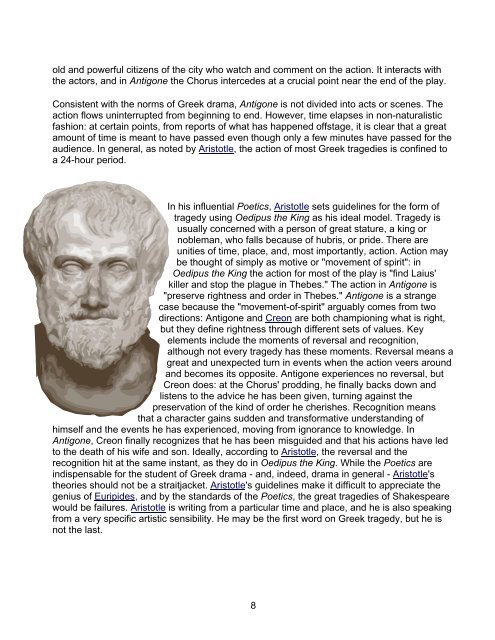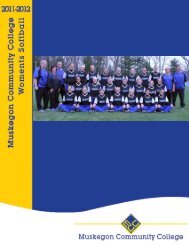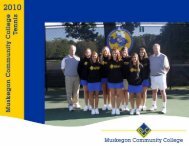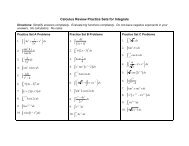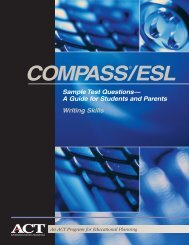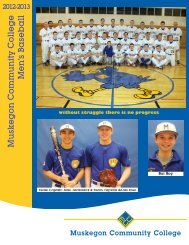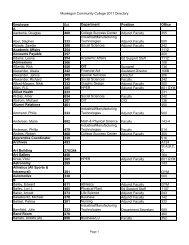Basic Information .3 - Muskegon Community College
Basic Information .3 - Muskegon Community College
Basic Information .3 - Muskegon Community College
Create successful ePaper yourself
Turn your PDF publications into a flip-book with our unique Google optimized e-Paper software.
old and powerful citizens of the city who watch and comment on the action. It interacts with<br />
the actors, and in Antigone the Chorus intercedes at a crucial point near the end of the play.<br />
Consistent with the norms of Greek drama, Antigone is not divided into acts or scenes. The<br />
action flows uninterrupted from beginning to end. However, time elapses in non-naturalistic<br />
fashion: at certain points, from reports of what has happened offstage, it is clear that a great<br />
amount of time is meant to have passed even though only a few minutes have passed for the<br />
audience. In general, as noted by Aristotle, the action of most Greek tragedies is confined to<br />
a 24-hour period.<br />
In his influential Poetics, Aristotle sets guidelines for the form of<br />
tragedy using Oedipus the King as his ideal model. Tragedy is<br />
usually concerned with a person of great stature, a king or<br />
nobleman, who falls because of hubris, or pride. There are<br />
unities of time, place, and, most importantly, action. Action may<br />
be thought of simply as motive or "movement of spirit": in<br />
Oedipus the King the action for most of the play is "find Laius'<br />
killer and stop the plague in Thebes." The action in Antigone is<br />
"preserve rightness and order in Thebes." Antigone is a strange<br />
case because the "movement-of-spirit" arguably comes from two<br />
directions: Antigone and Creon are both championing what is right,<br />
but they define rightness through different sets of values. Key<br />
elements include the moments of reversal and recognition,<br />
although not every tragedy has these moments. Reversal means a<br />
great and unexpected turn in events when the action veers around<br />
and becomes its opposite. Antigone experiences no reversal, but<br />
Creon does: at the Chorus' prodding, he finally backs down and<br />
listens to the advice he has been given, turning against the<br />
preservation of the kind of order he cherishes. Recognition means<br />
that a character gains sudden and transformative understanding of<br />
himself and the events he has experienced, moving from ignorance to knowledge. In<br />
Antigone, Creon finally recognizes that he has been misguided and that his actions have led<br />
to the death of his wife and son. Ideally, according to Aristotle, the reversal and the<br />
recognition hit at the same instant, as they do in Oedipus the King. While the Poetics are<br />
indispensable for the student of Greek drama - and, indeed, drama in general - Aristotle's<br />
theories should not be a straitjacket. Aristotle's guidelines make it difficult to appreciate the<br />
genius of Euripides, and by the standards of the Poetics, the great tragedies of Shakespeare<br />
would be failures. Aristotle is writing from a particular time and place, and he is also speaking<br />
from a very specific artistic sensibility. He may be the first word on Greek tragedy, but he is<br />
not the last.<br />
8


